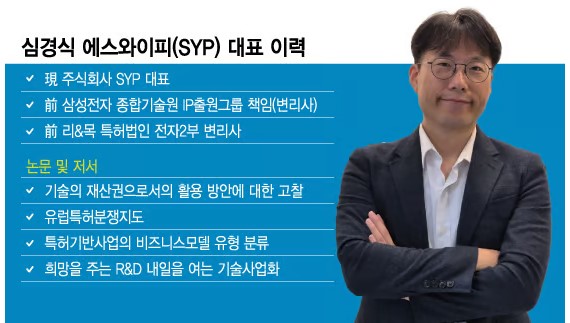"Do you want to become the next NVIDIA? Then open your patent fir…
Page info
Name admin Views 3,088 Datetime 24-07-10 08:34"I don't want patents to be regarded as just a means of protecting technology."
Shim Kyung-sik, CEO of the patent law office SYP, said, "Only patent analysis can further advance BM (business model) and reduce company operating costs."
CEO Shim Kyung-sik said in an interview with Money Today startup media platform "Unicon Factory," "In the big tech industry, where no clear leader companies such as AI (artificial intelligence), big data, and autonomous vehicles have appeared, it is necessary to periodically monitor and examine which patents have been applied for and registered recently and what the contents of the technology are." Only then can we properly grasp the direction of core businesses and R&D (R&D).
CEO Shim will give a lecture on the theme of "Overseas Applications and Strategies to Respond to Overseas IP Disputes" at the "Global Fast Track Academy" to be held at COEX Conference Room 327 in Seoul on the 13th. The event was organized by the Money Today start-up media platform Unicorn Factory and GDIN (Global Digital Innovation Network, former Bonto Global Center), a support organization specializing in Korean companies' overseas expansion.
SYP is an IP (intellectual property) based commercialization company that supports the growth cycle of startups through patent applications, technology transfer, and acceleration through more than 60 professionals, including patent attorneys, appraisers, and technology traders. It has posted a total of 350 technology transfers (about 45 billion won) over the past five years (2016-2020), and is working as a scale-up tip manager and super-gap 1000+ project investment attraction organization.
I believed it was made with original technology, but the result was "patent infringement."
In 2020, when real estate entertainment programs were in full popularity, a broadcaster recruited Company A with 3D mapping technology to easily show the structure of the house. Company A's technology shows the shape of a building in the form of a VR (virtual reality) by scanning the entire structure while robots travel from the basement to the top floor of the building and collecting the data.
When many investors show interest in Company A's spatial scanning technology, Company A's business is put on hold. This is because Company A's technology is similar to the 3D spatial mapping technology of overseas Nasdaq-listed Company M.
CEO Shim, who recalled at the time, said, "Company A secured the original technology in 3D scanning technology, but in the mapping part, it was similar to Company M's patent, so a strategy was needed to avoid it. If Company A ignored the patent analysis process and pushed ahead with follow-up R&D as planned and put the product on the market, it would have suffered great damage due to patent infringement lawsuits."
"Especially these days, in implementing a single product and service, there are many cases where several original technologies are included in it," he added. "Even if the company has a source patent, if it does not properly grasp the patent composition that constitutes the entire service and product, it will step on a patent infringement mine."
CEO Shim advised deep technology start-ups not to neglect patent analysis by competitors and leading companies, saying that patents can be a "great R&D compass."
"If we analyze patents of top foreign companies such as Nvidia, such as AI semiconductors these days, we will see what kind of R&D we should do in the future," he said. "Domestic companies tend to think about the need to analyze external or competitors' IPs, but it should never be overlooked as technology develops day by day and one technology is an industry that changes the game of the industry."
'Patent strategy' Lower operating costs and price competitiveness
In the case of Company A, as the previous example, there are many options. What is clear is that if you belatedly avoid Company M's patents and try to develop other technologies yourself, it will be a great burden on the company. In this case, it is wise to outsource.
CEO Shim said, "Most companies want to develop and internalize products and services on their own from beginning to end, but in some cases, calculating and selecting and applying how much external technology to employ will not only reduce costs but also help to gain price competitiveness," adding, "It will be very helpful to meet experts who can provide consulting in three dimensions by linking IP, BM (business model), and R&D."
"The patent strategy is now a necessity, not an option, for domestic companies to start and expand their businesses," he said. "In the announcement of the fast-track academy for global expansion, we plan to introduce various IP strategies through recent corporate consulting cases, such as why U.S. patent application and registration are more important than domestic ones and monetization strategies through standard patents."
In addition, the academy will hold lectures on practical experience and case-oriented experts such as △ overseas corporation establishment △ legal management △ overseas marketing and promotion △ major review points when listing special technology △ corporate accounting △ joint venture (JV) and government support projects necessary for overseas expansion △ global growth strategy.
GDIN, which led the development of this educational program, is a foundation tasked with helping domestic companies advance overseas, and has established more than 120 overseas corporations so far and attracted investment worth 5 trillion won.
Source: Money Today ( https://news.mt.co.kr/mtview.php?no=2024070308152346791)
Related Links
- https://news.mt.co.kr/mtview.php?no=2024070308152346791 2163 connections

